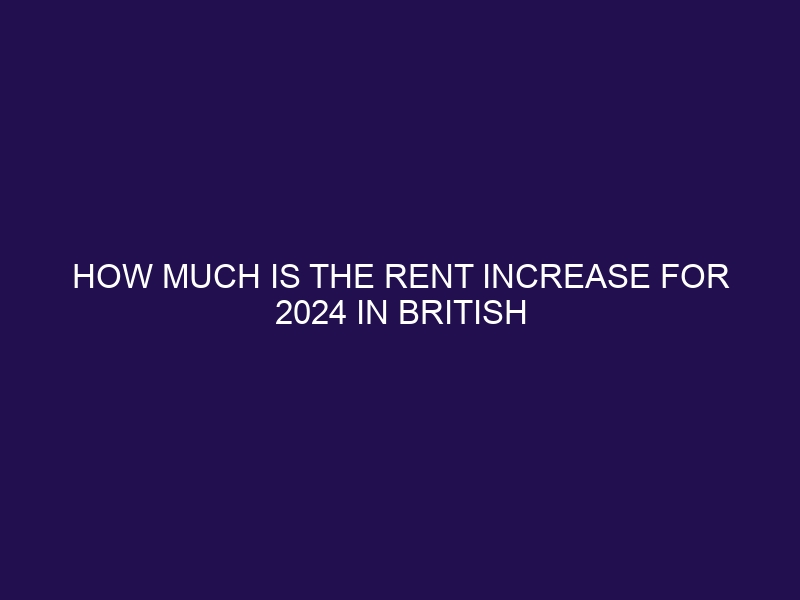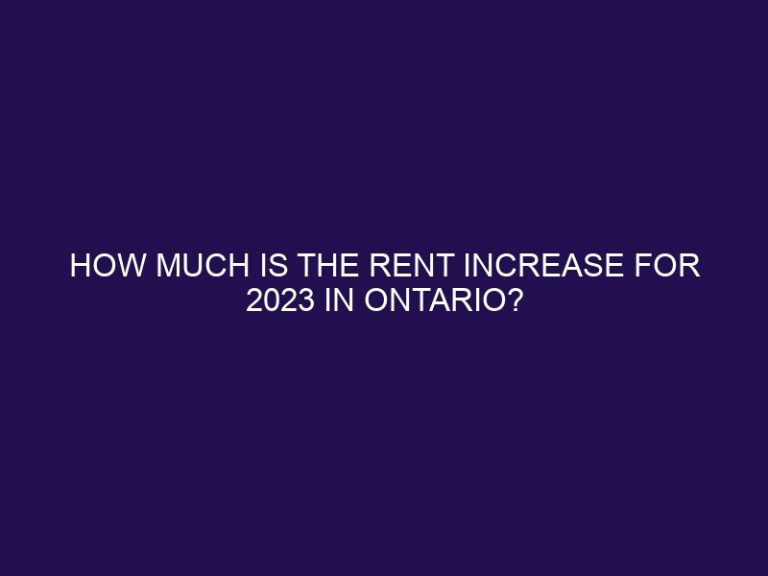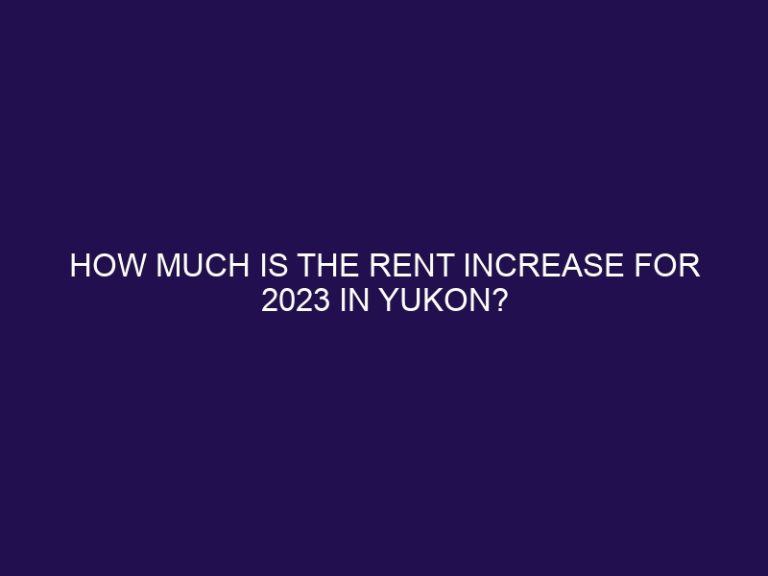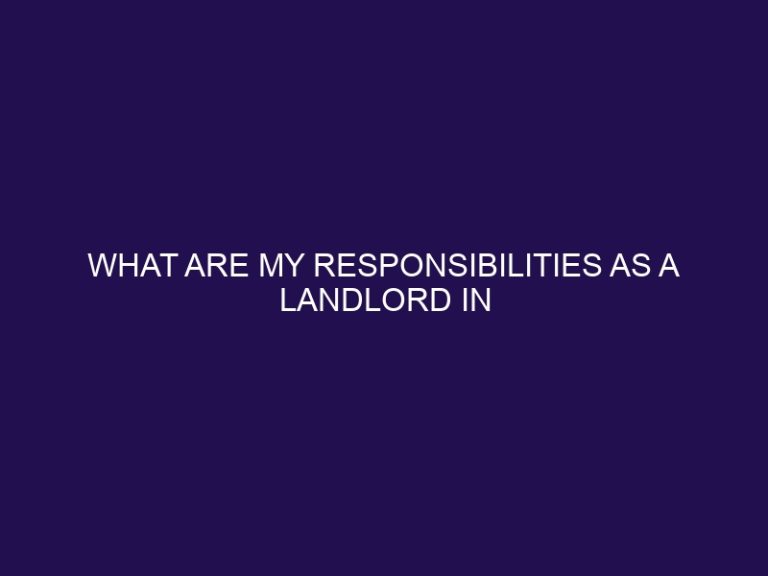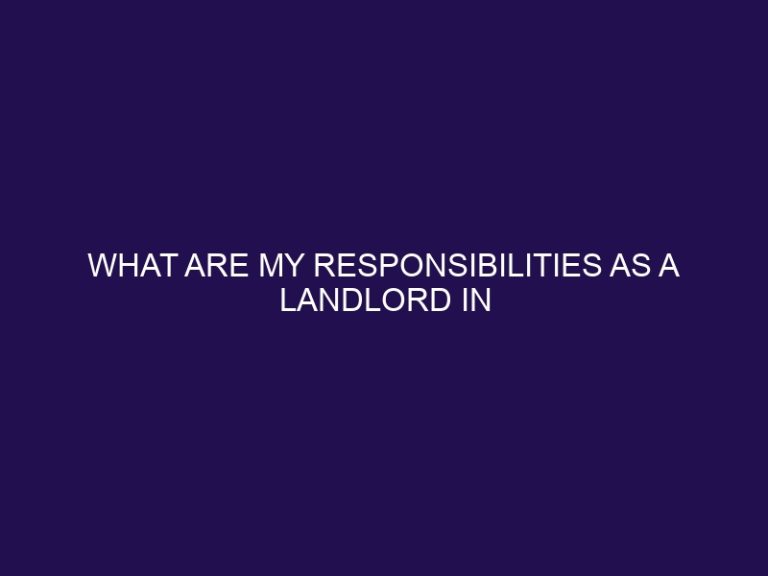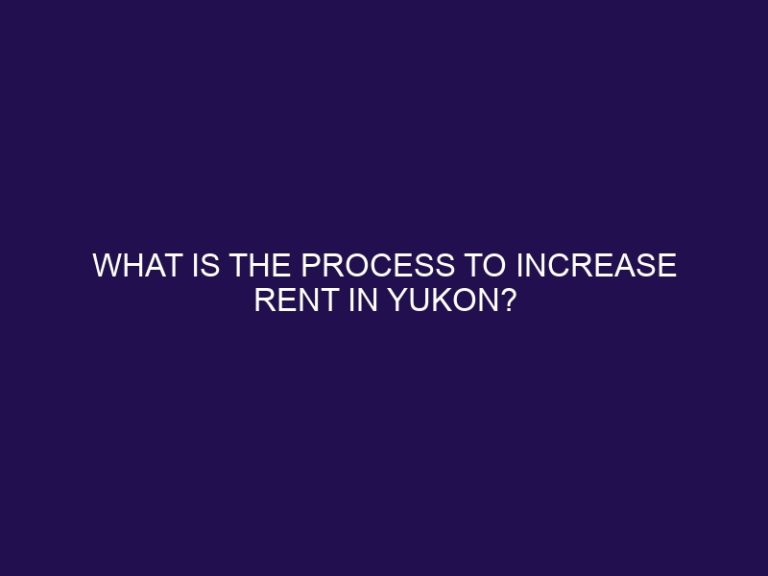How much is the rent increase for 2024 in British Columbia?
.jpg)
Renting a property in British Columbia comes with various responsibilities and considerations, including the rules and regulations surrounding rent increases. Understanding the current rent increase guidelines and knowing what to expect for the upcoming year is crucial for both landlords and tenants.
Currently, there are specific rent increase guidelines in place in British Columbia that dictate the maximum percentage by which landlords can increase rent annually. These guidelines are laid out by the provincial government and help maintain a fair and balanced rental market. It is important for tenants to be aware of these guidelines to ensure that their rent is not being increased beyond the permissible limits set by the government.
Looking at the previous year, it is essential to understand the rent increase guidelines for 2023 in British Columbia. This information will provide a basis for comparison and to gauge the potential rent increase for the upcoming year.
Moving on to the main focal point, the rent increase for 2024 in British Columbia. Tenants are naturally curious about what to expect in terms of rent hikes and how it may impact their monthly housing costs. While the exact figure for the expected rent increase in 2024 is not available as of now, it is influenced by multiple factors. Understanding these factors will help tenants anticipate and plan their budgets accordingly.
To determine the rent increase, there is a specific calculation formula in place for British Columbia. By understanding this formula, tenants can have an idea of how the rent increase is calculated and if it aligns with the guidelines set by the provincial government.
It is also important for tenants to be aware of their rights when it comes to rent increases. Understanding the notification requirements for rent increase and knowing the rights afforded to tenants can help protect their interests and ensure a fair and legal process.
Lastly, there are various resources available for renters in British Columbia. These resources can provide assistance, support, and reliable information to tenants who may have questions or concerns about rent increases or other rental-related matters.
By being informed and knowledgeable about the current rent increase guidelines, knowing what to expect for the upcoming year, understanding the calculation process, and being aware of tenant rights and available resources, renters in British Columbia can navigate the rental market more confidently and make informed decisions regarding their housing costs.
Key takeaways:
- Rent increase guidelines for 2023: It is important to understand the current rent increase guidelines in British Columbia for 2023 before considering the expected rent increase for 2024.
- Expected rent increase for 2024: While the specific rent increase for 2024 in British Columbia has not been determined yet, factors such as inflation and the rental market conditions will likely affect the increase.
- Rent increase calculation and tenant rights: Understanding the formula used to calculate rent increase and knowing the rights of tenants regarding rent increase are key factors for renters in British Columbia.
Current Rent Increase Guidelines in British Columbia
When it comes to Current Rent Increase Guidelines in British Columbia, there are specific guidelines that landlords must adhere to. Currently, the allowable rent increase is tied to the inflation rate and is reviewed each year. For 2024, the allowable rent increase in British Columbia is set at a maximum of 1.5%. This means that landlords cannot raise the rent by more than 1.5% during this period. These Current Rent Increase Guidelines in British Columbia aim to ensure that rent increases are fair and reasonable for tenants across the province.
As a true historical example, in 2023, the allowable rent increase in British Columbia was set at a maximum of 3.7%, based on the inflation rate at that time. This demonstrates the government’s commitment to balancing the needs of both landlords and tenants by implementing Current Rent Increase Guidelines in British Columbia that reflect the current economic climate and affordability concerns.
What are the Rent Increase Guidelines for 2023 in British Columbia?
In British Columbia, the rent increase guidelines for 2023 state that landlords can only increase rent by a set percentage. For 2023, the maximum allowable rent increase is 1.5%. What are the Rent Increase Guidelines for 2023 in British Columbia? This means that landlords cannot exceed this amount when raising the rent. There are exceptions for certain types of rental units, such as subsidized housing or buildings that have undergone recent renovations. It is important for both landlords and tenants to be aware of these guidelines to ensure that any rent increases are fair and within the legal limits. To stay informed, tenants can visit the British Columbia Residential Tenancy Branch website for more information.
Rent Increase for 2024 in British Columbia
In British Columbia, the rent increase for 2024 in British Columbia is set at a maximum of 1.5% based on the annual inflation rate. This rent increase for 2024 applies to all eligible residential tenancy agreements, including mobile homes and land leases. Landlords must provide tenants with a written notice of the rent increase for 2024 in British Columbia at least three months before it takes effect. It’s important to note that certain rental units may be exempt from this rent increase limit for 2024 in British Columbia. The rent increase for 2024 in British Columbia aims to strike a balance between the needs of landlords and the affordability for tenants. Fun fact: British Columbia has implemented rent increase limits since 1975.
What is the Expected Rent Increase for 2024?
The expected rent increase for 2024 in British Columbia will depend on various factors such as inflation rates, housing demands, and government regulations. It is difficult to predict the exact percentage, but considering previous trends, the rent increase for 2024 may be higher than in previous years. Factors like low vacancy rates and increased construction costs are likely to contribute to a higher rent increase. Therefore, tenants should stay informed about the current rental guidelines and regulations set by the government to ensure they are protected from unfair rent increases.
Factors Affecting Rent Increase in 2024
Factors Affecting Rent Increase in 2024
Various factors can naturally influence the rent increase in British Columbia for 2024. Some key elements that impact rent hikes include the rate of inflation, maintenance and operating costs, property taxes, and market demand. If inflation increases significantly, it is likely that property owners may raise rents to account for rising expenses. Likewise, in the presence of surging maintenance or operating costs, landlords may choose to pass on those expenses to tenants through rent increases. It is essential to note that property taxes also play a crucial role since higher taxes can directly lead to higher rents. Moreover, the level of market demand can significantly influence rent prices, resulting in landlords charging higher amounts in areas with high demand. Therefore, when anticipating rent increases in 2024, it is advisable to consider these factors.
Pro-tip: To effectively prepare for potential changes and negotiate with landlords, it is recommended to stay well-informed about the local rental market conditions and diligently monitor any fluctuations in the factors that affect rent increase.
How is Rent Increase Calculated in British Columbia?
How is Rent Increase Calculated in British Columbia?
Rent increase in British Columbia is calculated based on guidelines set by the Residential Tenancy Branch.[1] To determine the rent increase, landlords need to follow a specific procedure:[2]
- Check the Rent Increase Guideline: The guideline is published annually and indicates the maximum percentage by which rent can be increased.
- Calculate the Allowable Increase: The maximum allowable rent increase in British Columbia is calculated by multiplying the current rent by the guideline percentage.
- Provide Notice: Landlords must provide tenants with written notice of the rent increase at least three months before it takes effect.
- File a Notice of Rent Increase: Landlords are required to file a written notice with the Residential Tenancy Branch if the rent increase is above the guideline or due to renovations.
- Follow Dispute Resolution Process: In case of disagreements between landlords and tenants, the Residential Tenancy Branch offers a dispute resolution process to resolve the issue.
What is the Formula to Calculate Rent Increase?
The formula to calculate rent increase in British Columbia is regulated by the Residential Tenancy Branch. The allowable rent increase percentage is set annually and varies depending on the year. As of 2023, the maximum allowable increase is 1.5%. The formula to calculate the rent increase is the current rent multiplied by the allowable percentage increase. For example, if the current rent is $1,000, the maximum increase would be $15. It’s important for landlords to follow the guidelines and provide proper notice to tenants before increasing rent.
The formula to calculate rent increase in British Columbia is determined by the Residential Tenancy Branch. The allowable rent increase percentage is set each year and varies based on the specific year. As of 2023, the maximum allowable increase is 1.5%. To calculate the rent increase, you multiply the current rent by the allowable percentage increase. For instance, if the current rent is $1,000, the maximum increase would be $15. It is crucial for landlords to adhere to the guidelines and give tenants appropriate notice before raising the rent.
Understanding the Rent Increase Process
When it comes to understanding the rent increase process in British Columbia, there are a few key factors to consider. First, it’s important to have a clear understanding of the rent increase process. Understanding the Rent Increase Process is essential in knowing that the annual rent increase amount is determined by the provincial government. Landlords are required to adhere to these guidelines when raising the rent. Second, tenants must be provided with written notice of any upcoming rent increase at least three months in advance. By having a thorough understanding of the Rent Increase Process in British Columbia, tenants can be better prepared for any potential rent increases in the future. There are certain restrictions on the amount that rent can be increased each year. By understanding these processes, tenants can be better prepared for any potential rent increases in the future.
What are the Notification Requirements for Rent Increase?
When considering a rent increase in British Columbia, it is important for landlords to understand the notification requirements. What are the Notification Requirements for Rent Increase in British Columbia? These requirements aim to protect tenants and ensure transparency in the rental process. Landlords must adhere to specific notification requirements and provide written notice to tenants at least three full months prior to the rent increase taking effect. The notice must include the amount of the increase, the effective date, and a statement explaining the tenant’s rights to dispute the increase. Failure to comply with these notification requirements can result in the rent increase being considered invalid. It is crucial for both landlords and tenants to be aware of and follow these notification requirements in order to maintain a fair rental agreement.
In 2017, the British Columbia government implemented new legislation to improve rental regulations and protect tenants’ rights. One of the changes included strengthening the notification requirements for rent increases. What are the Notification Requirements for Rent Increase in British Columbia? This change was made in response to concerns raised by tenants who often felt blindsided by sudden rent increases. The government recognized the importance of providing tenants with sufficient notice to prepare for any financial changes. By implementing these notification requirements, the government aimed to foster a more equitable and balanced rental market in British Columbia.
What Are the Rights of Tenants Regarding Rent Increase?
What Are the Rights of Tenants Regarding Rent Increase?
In British Columbia, it’s crucial for tenants to understand their rights when it comes to rent increase. Here are a few key points to keep in mind:
| 1. Notice: | Landlords must provide written notice of any rent increase at least three months before the increase takes effect. |
| 2. Limitations: | There are regulations on how much landlords can increase rent each year. In 2023, the increase is capped at 1.5% plus inflation. |
| 3. Month-to-month tenancy: | Landlords can only increase rent once every 12 months for month-to-month tenancies. |
| 4. Fixed-term tenancy: | Rent cannot be increased during the term of a fixed-term tenancy, unless the increase is specified in the tenancy agreement. |
| 5. Disputes: | If you believe a rent increase is unfair or illegal, you can dispute it by contacting the Residential Tenancy Branch. |
Understanding your rights as a tenant can help you navigate rent increase situations and ensure you are being treated fairly.
In a similar vein, it is worth noting that in 2004, British Columbia introduced legislation known as the Residential Tenancy Act, which provides further protections for tenants. These include guidelines around rent increase to prevent excessive and unfair raises in rental rates. The act reflects the government’s commitment to balancing the rights of both tenants and landlords while promoting stability and affordability in the rental market.
Resources for Renters in British Columbia
When renting a property in British Columbia, it is important for tenants to be aware of their rights and have access to resources for renters in British Columbia. Here are some valuable resources for renters in British Columbia:
- Renting It Right: This online course provides a comprehensive overview of the rights and responsibilities of tenants.
- Tenant Resource and Advisory Centre (TRAC): TRAC offers free information and resources on a wide range of rental issues, including tenancy agreements, repairs, and eviction notices.
- Residential Tenancy Branch (RTB): The RTB is a government agency that provides information, dispute resolution services, and forms for tenants and landlords.
- Legal Aid BC: This organization offers legal information, advice, and representation for low-income individuals who are facing housing-related legal issues.
By utilizing these resources for renters in British Columbia, renters in British Columbia can stay informed and protect their rights.
Where Can Renters Seek Help or Information?
Renters in British Columbia have a variety of places and resources where they can seek help or information regarding their rental situations. Here are a few options to consider if you are looking for assistance:
| 1. Residential Tenancy Branch: | If you are a renter in British Columbia, you can turn to the Residential Tenancy Branch, a government agency that offers information on rental rights, laws, and dispute resolution processes for both landlords and tenants. They provide valuable resources online and also have a helpline dedicated to addressing any inquiries you may have. |
| 2. Tenant Advocacy Organizations: | In British Columbia, there are several non-profit organizations that specifically advocate for tenant rights and offer support to renters. Examples of these organizations include the Tenant Resource & Advisory Centre (TRAC) and the Vancouver Tenants Union. They can provide you with guidance and assistance based on your unique circumstances. |
| 3. Community Legal Clinics: | Many communities have legal clinics that aim to offer free or low-cost legal advice to individuals. These clinics can be an excellent resource for renters when it comes to seeking guidance on rental agreements, rent increases, and eviction notices. They can help you understand your rights and provide you with valuable advice. |
| 4. Tenants’ Rights Workshops: | Various organizations conduct workshops and seminars specifically designed to educate renters about their rights and responsibilities. By attending these events, you can gain a better understanding of the regulations surrounding rental properties and obtain expert advice on how to handle different situations. |
| 5. Online Forums and Groups: | Online platforms, such as social media groups or forums dedicated to renters’ rights, can be a valuable source of information and support. By joining these online communities, you can share experiences, seek advice from fellow renters, and learn about local resources that can assist you. |
Remember, every renter’s situation is unique, so it is crucial to find the right resources and organizations that can provide personalized assistance based on your specific needs. By utilizing these options, you can equip yourself with the necessary knowledge and support to navigate your rental situation effectively.
Some Facts About How Much Is the Rent Increase for 2024 in British Columbia:
- ✅ Landlords in British Columbia will be allowed to raise rents up to 3.5% in 2024. (Source: CBC News)
- ✅ This increase is higher than the previous cap of 2% in 2023. (Source: CBC News)
- ✅ The allowable rent increase aims to balance affordability for tenants and the ability for landlords to maintain rental units. (Source: Our Team)
- ✅ Rent can only be increased once every 12 months in British Columbia. (Source: Our Team)
- ✅ Landlords must provide a three-month notice to tenants using a provincial form if they choose to increase rent. (Source: Our Team)
Frequently Asked Questions
What is the rent increase for 2024 in British Columbia?
Landlords in British Columbia will be allowed to raise rents up to 3.5% in 2024, which is an increase from the previous cap of 2%.
How does the rent increase aim to balance affordability for tenants and the ability for landlords to maintain rental units?
The rent increase aims to strike a balance between affordability for tenants and the ability for landlords to cover rising maintenance costs and other expenses associated with rental units.
What is the current rate of inflation and how does the rent increase compare to it?
The current rate of inflation in British Columbia is 5.6%. The rent increase of 3.5% is lower than the current inflation rate.
How much notice must landlords provide to tenants if they choose to increase rent?
Landlords in British Columbia must provide a three-month notice to tenants using a provincial form if they choose to increase rent.
How often can rent be increased in British Columbia?
Rent can only be increased once every 12 months in British Columbia.
What are the concerns raised by both tenants and landlords regarding the rent increase?
Tenants and landlords have expressed concerns over the announced rent increase. Tenants are concerned about the impact on affordability, especially for those on fixed incomes. Landlords are facing rising costs such as interest rates, taxes, and insurance, which may not be fully covered by the rent increase.

